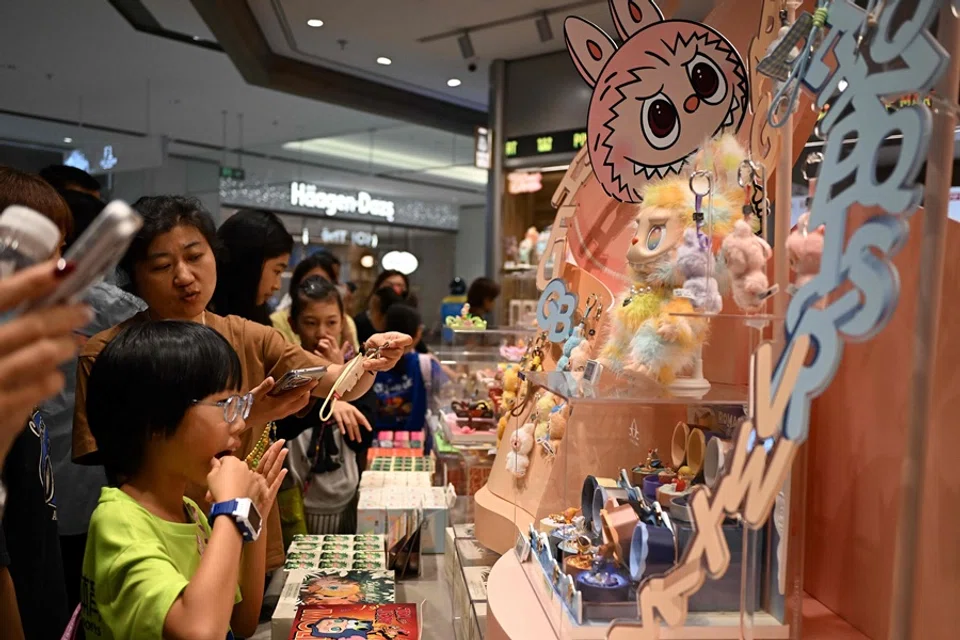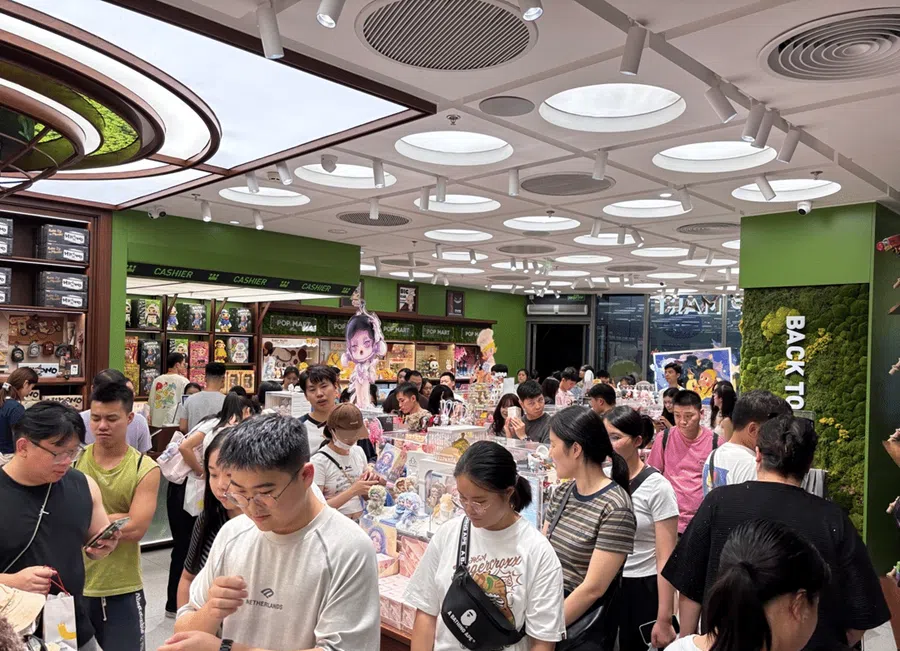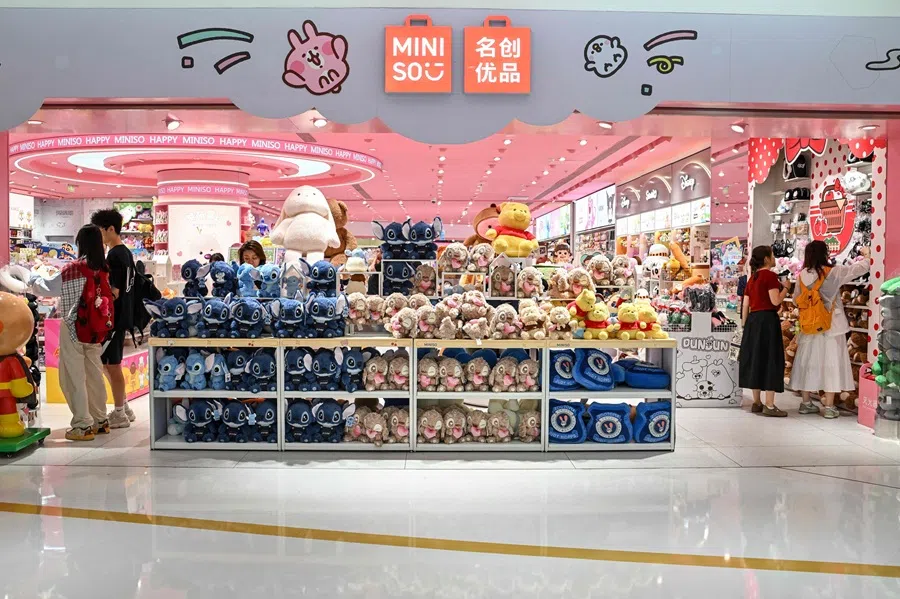China’s adult babies: Why a generation is retreating to childhood
As China’s adults seem to be regressing into childhood, the “kidult” industry is thriving. How long will this last, and what is driving the trend? Lianhe Zaobao correspondent Li Kang looks into the phenomenon.

“Baobao (宝宝, lit. baby), it’s been a long time!” As soon as I walked into a cafe near my place, I heard a greeting from a staff member.
This was not the first time I was called “baobao” in China. During livestreaming sessions, hosts often open with “Welcome, new baobaos (newcomers)!” And on social media, an online stranger might suddenly chime in with “Baobao (baby), do you know XXX?”
A way of life
“Baobao” is not just a way people address each other online; it has also become a lifestyle. On the street, it is now much more common to see plush toy keychains on the backpacks of people of all ages and genders — not having a couple can make you seem out of place. When the Jellycat Cafe arrived in Shanghai last year, many queued for two hours just to buy a small plush toy priced at several hundred RMB (100 RMB is roughly US$14).
... more and more Chinese adults are actively reverting to becoming “baobaos” or “babies”.
From language and fashion styles to consumer choices, these signs all point to a growingly noticeable trend: more and more Chinese adults are actively reverting to becoming “baobaos” or “babies”.
Adults becoming “babies” is not a new concept. As early as the 1950s, the concept of the “kidult” was coined in the Western television industry by combining the words “kid” and “adult” to describe adults who enjoy watching programmes for children. At that time, TV stations even scheduled cartoons in the evening timeslot after work to attract adult viewers.

More than half a century later, The Economist in 2023 captured the return of “kidulting”. In places like the UK and Spain, more adults are entering playgrounds designed for children, seeking their inner child.
In China, while there is no clear timeline for “kidulting”, it is closely linked to the current economic and social environment. On one hand, adults who experienced rapid economic growth and wealth expansion but are now faced with the reality of layoffs and shrinking asset value inevitably feel unprecedented pressure and nostalgia. Going back to being “babies” and remembering the good old times of economic prosperity provides them with emotional respite.
In recent weeks, there has been news of several universities in China holding parent-teacher meetings...
No space to grow up
On the other hand, contemporary Chinese youth, to some extent, lack the space to grow up. In recent weeks, there has been news of several universities in China holding parent-teacher meetings, providing yet another example of why Chinese youths are unable to grow up.
Some opinions have suggested that universities should be a platform for youth to become independent, but parental involvement in university management reflects how universities are becoming like high-schools, contributing to cultivating “giant infants” in society.
In May, Professor Yan Yunxiang from the Department of Anthropology at the University of California, Los Angeles, introduced the concept of “expanded adolescence”. He stated that the adolescence of China’s Gen Z is being lengthened at both ends: digital technology and social media are accelerating the early maturity of children, while more young people consciously delay or even avoid transitioning to adulthood.

Yan explained that this delay stems not only from economic factors such as rising living costs and an unstable job market, but also from the tendency of today’s youth to prioritise personal fulfilment over societal expectations. In other words, today’s Chinese youths are acutely aware of the burdens and responsibilities that come with adulthood, yet with increasing autonomy and personal space, they feel little urgency or motivation to fully step into it.
... sadness and loneliness among adults worldwide reached record highs that year, with 41% reporting feeling “a lot of stress” on a daily basis.
A thriving market
Whether it is adults longing to return to the past or youths reluctant to grow up, their choices are understandable in today’s context. From a sociopsychological perspective, modern people are indeed under unprecedented pressure. According to Gallup’s 2021 State of the Global Workplace report, sadness and loneliness among adults worldwide reached record highs that year, with 41% reporting feeling “a lot of stress” on a daily basis.
Moreover, the desire to be a “baby” again is not unique to China. A global survey conducted last year by market research firm Ipsos found that, amid economic turmoil and geopolitical tensions, 60% of respondents worldwide want their country to be the way it “used to be”.
From an economic and consumer perspective, adults’ “childlike mentality” has sparked new consumption trends, driving growth in the IP toy industry and the kidult economy.

According to the 2025 China IP Toy Industry Report, the market for IP derivatives in China grew at a compound annual rate of over 15% between 2020 and 2024, with the market expected to exceed 202.5 billion RMB this year. A JD.com survey on this year’s Children’s Day revealed that 56.8% of adults bought toys for themselves, while 51.1% planned to celebrate the day as if for themselves.
However, after briefly becoming a “baby” again, and finding comfort and healing in plush toys, one eventually has to return to the not-so-rosy reality. For adults, the risk of unemployment remains, the financial losses from falling property prices still need time to recover, and practical concerns — such as making up missed social security payments and delayed retirement — are unavoidable issues facing most people.
For youths in a society that offers limited opportunities for real-world experience, learning to take responsibility and practising independence is not only an essential part of growing up, but also a prerequisite for entering the real world. The path may not be as pleasant, but it is the starting point of true freedom.
This article was first published in Lianhe Zaobao as “在中国做回“宝宝””.





![[Big read] When the Arctic opens, what happens to Singapore?](https://cassette.sphdigital.com.sg/image/thinkchina/da65edebca34645c711c55e83e9877109b3c53847ebb1305573974651df1d13a)